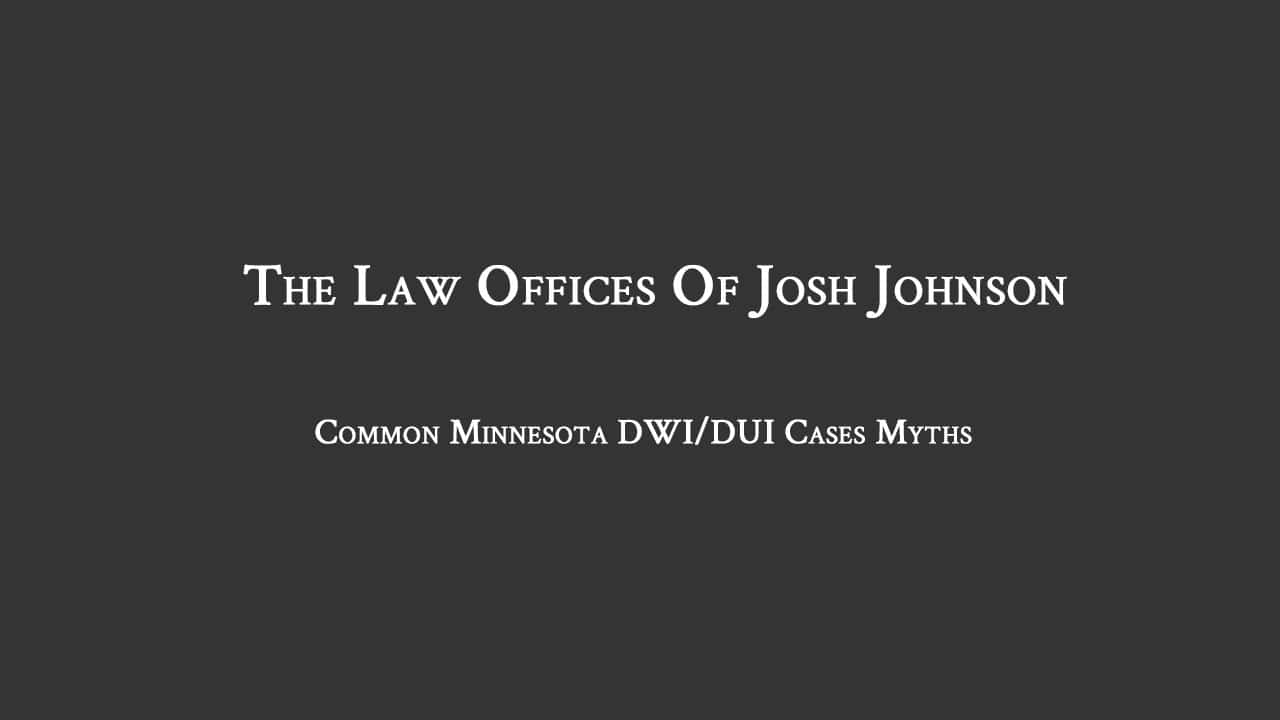Common Myths DWI/DUI Cases
Common Myths About DWI/DUI Cases
Myth #1: You Can’t Win a DWI Case
DWI cases are complex, especially in Minnesota where most DWI cases involve a criminal charge and a civil driver’s license case (also called the Implied Consent case or IC). However, various strategies can help reduce the impact of a DWI on your criminal record, your personal life, and your ability to have a valid driver’s license. An experienced attorney will review the police reports, squad- or body-camera video, statements, and any recordings made during or after your arrest. In some cases, an attorney can identify mistakes made by police or find factual discrepancies that can even lead to the dismissal of your case.
Myth #2: Everyone Facing DWI Charges is Guilty
Many people harbor the misconception that all individuals facing DWI charges are guilty. But this isn’t the case. Depending on the machine and the analysis techniques used, breath tests can be inaccurate. For example, under Minnesota law, a Preliminary Breath Test (or PBT) cannot be used in court to prove the blood alcohol level (BAC) of an individual charged with a DWI according to Minn. Stat. § 169A.41. Other situations may require that police obtain a warrant prior to obtaining a test to assess a driver’s BAC as was determined in Bernard v. Minnesota. A skilled DWI lawyer can help determine if there is an argument to contest breathalyzer results in court and help advise you if such an argument would be beneficial for your case.
Myth #3: All Defense Lawyers Can Defend You in a DWI Case.
Not all attorneys have the expertise to handle DWI cases. If faced with such charges, avail yourself of the guidance of a DWI attorney with years of experience handling both the criminal and civil cases associated with DWI charges. With experienced legal counsel, you have the best chance of a favorable outcome.
Myth #4: You Can’t Be Charged if You Decline to Provide a BAC Test.
It may be tempting not to provide a breath test when arrested for a DWI, but this can result in a charge for Test Refusal which is a gross misdemeanor in Minnesota. The same logic applies if the officers obtain a warrant for a blood or urine test, and again, refusing to submit a test, under those circumstances, will likely result in a charge for DWI Test Refusal under Minn. Stat. § 169A.20, subd. 2.
Refusal is typically only beneficial in a first-time offense when the driver is likely to provide a test over twice the legal limit at the police station (a 0.16 BAC or higher). Under those circumstances, the charge for Test Refusal – and the driver’s license revocation that goes along with it – will typically result in penalties that are lower than the corresponding penalties for a first-time, high-reading DWI.
Myth #5: You Should Answer Police Questions.
Unless your lawyer is present, it’s never a good idea to make statements to the police above and beyond what is required. You should comply with requests to identify yourself, provide a proper ID and proof of insurance, but don’t answer any other questions. Many suspects make the mistake of lying to police, which can result in additional criminal charges. Rather than lying, make no statement at all.
As soon as you have the opportunity to do so, consult with a DWI attorney, and ensure that any statements made to the police are made only in the presence of, and upon the advice of, your attorney.
Myth #6: You Can’t Be Arrested for DWI if You Don’t Show Obvious Signs of Drunkenness.
Police officers typically do conduct field sobriety tests, but they also rely on breath tests and other indicators of intoxication to determine if somebody is operating a motor vehicle under the influence of drugs or alcohol. You may not show any signs of intoxication during the field sobriety tests, but you can still be asked to submit to testing or even arrested if the officer believes that, considering the totality of the circumstances, you are too impaired to drive. The arresting officer’s “totality of the circumstances” analysis considers everything, including your driving conduct, whether you display any visible indicators of intoxication, and how you conduct yourself around the officer. Even if you pass your field sobriety tests, there is a chance you will be asked to submit to a test, and if your BAC is at 0.08 or higher, you can be arrested and potentially charged with DWI.
Conclusion
There are many myths surrounding DWI cases. It’s critical to have the right information when faced with DWI charges. Get advice you can count on from a professional DWI attorney.
We can help. Contact us to begin discussing your case.
Sitemap
Minneapolis Office
310 Fourth Avenue S #7000
Minneapolis, MN 55415
(612) 730-1738
St Paul Office
656 Selby Avenue Suite 230
St. Paul, MN 55104
(651) 785-5342
Copyright © 2020, Josh Johnson Attorney at Law


